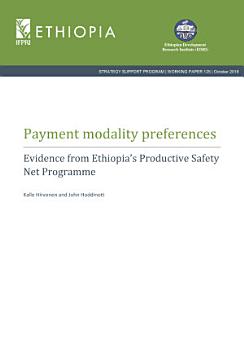Payment modality preferences: Evidence from Ethiopia’s Productive Safety Net Programme
Hirvonen, Kalle · Hoddinott, John F.
okt 2018 · ESSP Working Paper 125. raamat · Intl Food Policy Res Inst
5,0star
1 arvustusreport
E-raamat
25
lehekülge
family_home
Sobilik
info
reportHinnangud ja arvustused pole kinnitatud. Lisateave
Teave selle e-raamatu kohta
Economists typically default to the assumption that cash is always preferable to an in-kind transfer. We extend the classic Southworth (1945) framework to predict under what conditions this assumption holds. We take the model to longitudinal household data from Ethiopia where a large-scale social safety net intervention – the Productive Safety Net Programme (PSNP) – operates. Even though most PSNP payments are paid in cash, and even though the (temporal) transaction costs associated with food payments are higher than payments received as cash, the overwhelming majority of the beneficiary households prefer their payments only or partly in food. However, these preferences are neither homogeneous nor stable. Higher food prices induce shifts in preferences towards in-kind transfers, but more food secure households and those closer to food markets and to financial services prefer cash. There is suggestive evidence that preferences for food are also driven by self-control concerns.
Hinnangud ja arvustused
5,0
1 arvustus
Hinnake seda e-raamatut
Andke meile teada, mida te arvate.
Lugemisteave
Nutitelefonid ja tahvelarvutid
Installige rakendus Google Play raamatud Androidile ja iPadile/iPhone'ile. See sünkroonitakse automaatselt teie kontoga ja see võimaldab teil asukohast olenemata lugeda nii võrgus kui ka võrguühenduseta.
Sülearvutid ja arvutid
Google Playst ostetud audioraamatuid saab kuulata arvuti veebibrauseris.
E-lugerid ja muud seadmed
E-tindi seadmetes (nt Kobo e-lugerid) lugemiseks peate faili alla laadima ja selle oma seadmesse üle kandma. Failide toetatud e-lugeritesse teisaldamiseks järgige üksikasjalikke abikeskuse juhiseid.










